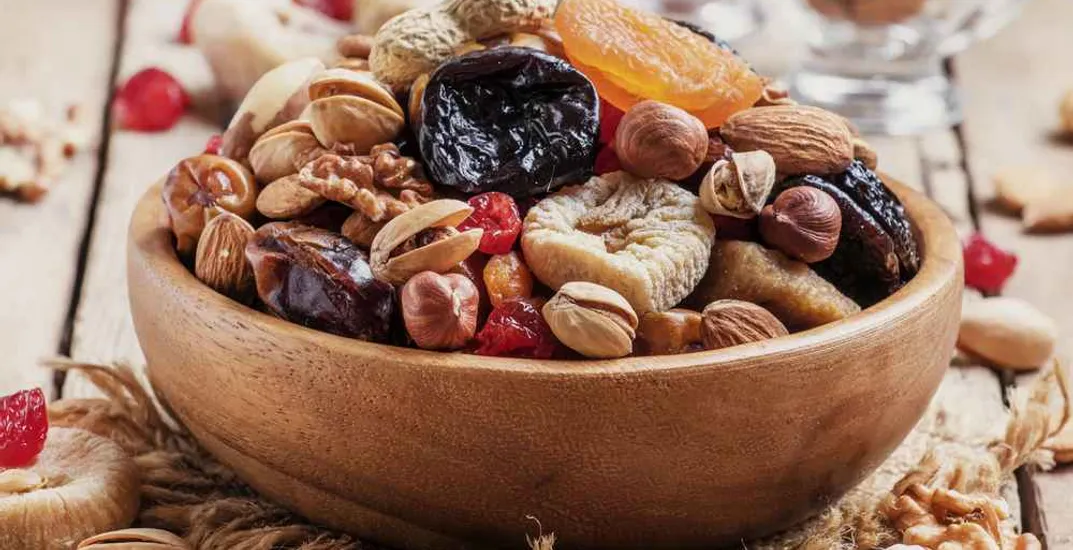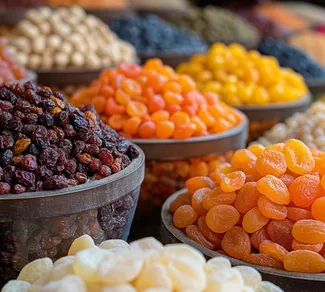Get the Best Dry Fruits Online in Lahore and Warm Up Your Winter!
As the chilly winds start to creep in and the evenings grow colder, there’s something comforting about cozying up at home with a handful of dry fruits.
We all know that it’s like a little winter ritual in Pakistan—grabbing a mix of almonds, walnuts, or raisins to munch on while catching up with family or enjoying your favourite TV show.
With the winter season approaching, it’s time to stock up on your favourites. But why step out into the cold when you can soon get the best dry fruits online in Lahore right from the warmth of your home?
So, while you stay cozy and warm up your winter, we’ll bring the crunch to you!
Where Can I Buy Dry Fruits Online in Lahore?
In Pakistan, we are blessed with a climate that allows us to grow some of the finest dry fruits in the world.
The lush valleys of Baluchistan and the fertile plains of Punjab produce an abundance of high-quality dry fruits. Whether it's the crisp almonds from Swat, the rich walnuts from Kashmir, or the prized pine nuts from the northern regions, our dry fruits are renowned for their exceptional taste and quality.
And guess what?
Kitchen Hand Online is about to make your life a lot easier. Soon, you'll be able to get the best dry fruits online in Lahore, delivered right to your door. So, no more bundling up to head out in the cold!
Here is a sneak peek at what we are going to bring you this winter
Top Dry Fruits in Pakistan
Almonds (Badam)
Almonds, or Badam as we call them, are one of the most popular dry fruits in Pakistan.
Grown primarily in the Swat region, these crunchy delights are a staple in every household during winter. Almonds are packed with healthy fats, protein, and fibre, making them a heart-healthy snack that also keeps you full for longer. They're rich in vitamin E, which is great for your skin and immune system.
In Pakistan, almonds are often enjoyed roasted with a sprinkle of salt, added to desserts like kheer, or used in traditional winter drinks like Badam milk, which is known for its warming properties.
Walnuts (Akhrot)
Walnuts, or Akhrot, are another winter favourite in Pakistan.
These brain-shaped nuts are not just good for your noggin but are also loaded with omega-3 fatty acids, which are essential for heart health. Most of Pakistan's walnuts come from the northern regions, particularly Kashmir, where the cool climate and fertile soil produce some of the best walnuts in the world.
Walnuts are often eaten on their own, added to baked goods like walnut cake, or used in traditional dishes like halwa to add a rich, nutty flavour.
Cashews (Kaju)
Cashews, known as Kaju, are a bit of a luxury when we talk about dry fruits, but their creamy texture and rich taste make them worth every penny.
While cashews are not native to Pakistan, they are widely consumed and loved across the country. Cashews are rich in healthy fats, magnesium, and antioxidants, making them a great snack for boosting your energy and supporting overall health.
Here in Pakistan, cashews are often used in sweets like kaju katli, a popular winter treat, or simply roasted with a pinch of salt.
Pistachios (Pista)
Pistachios, or Pista, are often referred to as the 'green gold' due to their vibrant color and rich taste.
These nuts are grown in Balochistan, where the dry climate is perfect for producing top-quality pistachios. Pistachios are packed with protein, fibre, and antioxidants, making them a healthy snack that also supports heart health.
Pistachios are often used in desserts like barfi and pista kulfi in Pakistan, adding a delightful crunch and a pop of colour to these sweet treats.
Raisins (Kishmish)
Raisins, or Kishmish, are the dried form of grapes and are often referred to as nature's candy.
They are sweet, chewy, and packed with energy-boosting carbohydrates. In Pakistan, raisins are grown in the sunny regions of Punjab and Sindh, where the climate allows for the perfect drying process.
Raisins are a common ingredient in a variety of traditional Pakistani dishes, including pulao, where they add a punch of sweetness, or in desserts like sheer khurma, which is a must during winter festivities.
Dates (Khajoor)
Dates, or Khajoor, have a special place in Pakistani culture, especially during the holy month of Ramadan.
However, they are also a popular winter snack due to their natural sweetness and high energy content. Dates are rich in fibre, potassium, and iron, making them a great food for boosting energy and supporting digestive health.
Most of the dates in Pakistan come from the Sindh region, where the hot and dry climate is ideal for their growth. As we are talking about winter, dates are often stuffed with almonds or walnuts and enjoyed as a quick and healthy snack.
Figs (Anjeer)
Figs, or Anjeer, are one of the oldest cultivated fruits in the world and have been a part of the Pakistani diet for centuries.
Grown primarily in the northern regions, figs are a rich source of fibre, vitamins, and minerals, making them a great choice for maintaining digestive health and boosting immunity.
Figs are often enjoyed dried, added to desserts like fig halwa, or used in traditional remedies for various ailments, here in Pakistan.
Apricots (Khurma)
Apricots, or Khurma, are a sweet and tangy fruit that is loved across Pakistan.
Most of Pakistan’s apricots come from the Gilgit-Baltistan region, where they are sun-dried to preserve their natural sweetness. Apricots are rich in vitamins A and C, fibre, and antioxidants, making them a great snack for maintaining eye health and boosting immunity.
Dried apricots in Pakistan are often enjoyed on their own or added to dishes like biryani for a sweet contrast to the savoury flavours.
Prunes (Aaloobukhara)
Prunes, or Aaloobukhara, are dried plums that are known for their natural laxative properties, making them a great choice for maintaining digestive health.
Prunes are rich in fibre, vitamin K, and antioxidants, which help support bone health and reduce inflammation. In Pakistan, prunes are often used in traditional dishes like chicken karahi or as a tangy addition to chutneys. They are also enjoyed as a sweet and healthy snack on their own.
Pine Nuts (Chilgoza)
Pine nuts, or Chilgoza, are one of the most expensive and sought-after dry fruits in Pakistan.
Grown in the high-altitude forests of the northern regions, pine nuts are a rich source of healthy fats, protein, and antioxidants. They have a unique, buttery flavour that makes them a favourite in many traditional Pakistani dishes.
Pakistani often use pine nuts in desserts like gajrela to add a rich, nutty flavour, or they simply enjoy them roasted as a luxurious snack.
Buy Dry Fruits Online in Lahore from Kitchen Hand Online!
Winter in Pakistan is a season that invites warmth, comfort, and of course, the joy of munching on dry fruits.
As the season approaches, we're excited to bring you the finest selection of dry fruits online in Lahore at Kitchen Hand Online. From the heart-healthy almonds of Swat to the exotic pine nuts of the northern regions, we will get you quality dry fruits across Pakistan to ensure top quality and freshness.
Soon, you'll be able to order these nutritious treats online and we will deliver them straight to your doorstep, making it easier than ever to enjoy the flavours of winter without leaving your cozy home.
So, stay warm, stay cozy, and stay tuned for the launch of our dry fruits collection, coming to you this winter!
about Author
Manzoor Ahmed
My name is Manzoor Ahmed. Please do not call me a foodie, you can call me a Food Lover!
Recent Posts

Healthy Iftar with Fresh Fruits in Ramadan in Pakistan

Ramadan 2025 in Pakistan: Order Fresh Fruits in Lahore

Dry Fruit Price in Lahore: All You Need to Know in 2025



